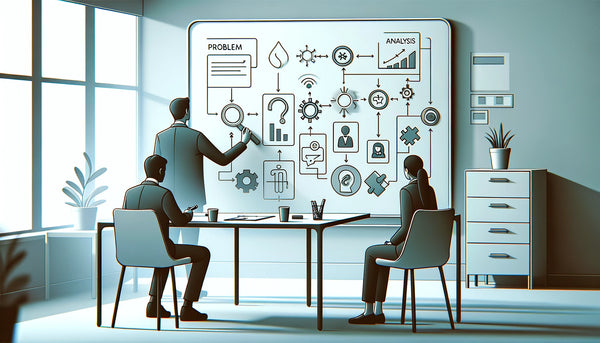Communicate Your Value In Interviews | As Per Hiring Leaders

In today's competitive job market, effectively communicating your value during interviews is crucial to stand out from other candidates.
Hiring leaders emphasize the importance of candidates clearly articulating their skills, strengths, and achievements to demonstrate the value they can bring to the company.
This article will provide insights into how to communicate your value in interviews based on the perspectives of hiring leaders.
Preparing for the Interview: Self-Assessment and Research

1. Identifying Your Unique Strengths and Skills
Prior to the interview, take time to reflect on your unique strengths and skills. This self-assessment will enable you to identify the qualities that differentiate you from other candidates.
Once you recognize your strengths, you can effectively highlight them during the interview.
2. Understanding the Company and Role
Thoroughly researching the company and the role you are applying for is crucial. It demonstrates your interest, dedication, and preparedness.
Familiarize yourself with the company's culture, values, products or services, and recent accomplishments. Tailor your responses during the interview to align with the company's goals and requirements.
3. Exploring Your Strengths
When conducting a self-assessment, it's important to delve deep into your strengths and skills. Consider not only your technical abilities but also your soft skills, such as communication, leadership, and problem-solving.
Reflect on past experiences where you have demonstrated these strengths and think about how they can be applied to the role you are interviewing for.
By understanding your strengths in a comprehensive manner, you will be better equipped to articulate them confidently during the interview.
4. Researching the Company
While researching the company, go beyond the surface-level information available on their website. Look for news articles, press releases, and industry reports that provide insights into the company's recent achievements, challenges, and future plans.
This will demonstrate your commitment to understanding the company's position in the market and your ability to adapt to its evolving needs.
Additionally, try to find connections between your own experiences and the company's values or mission statement.
This will enable you to showcase your alignment with the company's goals and make a stronger impression during the interview.
Techniques for Effectively Communicating Your Value

1. Using Storytelling to Highlight Your Achievements
Storytelling is a powerful technique to engage the interviewer and effectively communicate your value. Share specific examples that showcase your achievements, problem-solving abilities, and how you contributed to the success of past projects or initiatives. Craft a compelling narrative that demonstrates your skills and outcomes.
For example, imagine you are interviewing for a marketing position. Instead of simply stating that you increased sales by 20% in your previous role, you can use storytelling to bring that achievement to life.
You could describe how you identified a gap in the market, developed a creative marketing campaign, and successfully executed it, resulting in a significant boost in sales.
By providing this level of detail, you not only communicate your value but also allow the interviewer to visualize your impact and potential contributions to their organization.
2. Demonstrating Your Skills through Problem-Solving
In addition to storytelling, demonstrate your skills by solving real or hypothetical problems. This approach allows you to showcase your critical thinking, decision-making abilities, and how you approach challenges.
Walk the interviewer through your logical and systematic problem-solving approach, emphasizing your value in generating effective solutions.
For example, let's say you are interviewing for a software engineering position. Instead of simply stating that you have strong problem-solving skills, you can provide a detailed example of how you tackled a complex coding issue.
Explain the problem you encountered, the steps you took to analyze it, and the innovative solution you developed. By doing so, you not only demonstrate your technical expertise but also highlight your ability to think critically and find efficient solutions.
Moreover, you can take it a step further by proposing a hypothetical problem related to the company's industry and showcasing how you would approach solving it. This not only demonstrates your proactive mindset but also allows the interviewer to envision your potential contributions to their team.
The Do's and Don'ts of Interview Communication

1. Avoiding Common Communication Mistakes:
Avoiding communication mistakes is as important as showcasing your strengths. In an interview, every word you say matters.
It's crucial to be mindful of potential pitfalls that can hinder effective communication.
1.1 Talking Excessively
One common mistake is talking excessively. While it's important to provide relevant information, rambling on can make you come across as unfocused or lacking in self-awareness.
1.2 Interrupting the Interviewer
Another mistake to avoid is interrupting the interviewer. It's essential to listen attentively and wait for your turn to speak. Interrupting can be seen as disrespectful and may give the impression that you are not a good team player.
1.3 Using Excessive Jargon
Using excessive jargon is another communication mistake to steer clear of. While it's important to demonstrate your knowledge and expertise, bombarding the interviewer with technical terms can make you appear inaccessible or unrelatable. Instead, strive for clarity and simplicity in your communication.
1.4 Failing to Listen
Lastly, failing to listen actively is a common pitfall. Active listening involves not only hearing the interviewer's words but also understanding their meaning and intent. Practice active listening by pausing before responding and asking clarifying questions to demonstrate your effective communication skills.
2. Emphasizing Positive Communication Habits
On the positive side, effective interview communication involves more than just avoiding mistakes. It's about displaying enthusiasm, confidence, and kindness throughout the conversation.
2.1 Show Excitement
When you walk into the interview room, let your genuine interest in the role shine through. Show excitement about the opportunity to contribute to the company and make a difference.
Your positive attitude will not only make you more likable but also demonstrate your motivation and eagerness to succeed.
2.2 Express Gratitude
Expressing gratitude is another positive communication habit that can leave a lasting impression.
Take a moment to thank the interviewer for their time and for considering you for the position. Showing appreciation reflects your professionalism and manners, which are highly valued in any workplace.
2.3 Engage in Respectful Dialogue
Additionally, engage in courteous and respectful dialogue throughout the interview. Treat the interviewer with respect, listen actively, and respond thoughtfully. By doing so, you will not only showcase your excellent communication skills but also leave a positive and memorable impression on the interviewer.
Following Up After the Interview

1. Reinforcing Your Value in Follow-Up Communications
After the interview, following up with a personalized thank-you note or email to express your gratitude for the interview opportunity is essential.
This is also an opportunity to reiterate your value by summarizing the highlights of the interview, emphasizing your skills, and expressing your continued interest in the position.
2. Maintaining Professionalism in Post-Interview Interactions
Remember to maintain professionalism in all post-interview interactions. If you receive a job offer, respond promptly in a professional and courteous manner.
If you are not selected, express gratitude for the opportunity and inquire about any feedback that can help you improve for future interviews.
By understanding the importance of communicating your value, properly preparing for the interview, utilizing effective techniques, and maintaining professionalism, you can greatly increase your chances of success.
Implement these strategies, and you will be on your way to confidently showcasing your value in interviews according to the insights provided by hiring leaders.
Understanding the Importance of Communicating Your Value

1. The Role of Self-Presentation in Interviews
During an interview, your self-presentation plays a significant role in how hiring leaders perceive you.
1.1 Non-verbal Cues
It's not just about what you say, but also how you say it.
Non-verbal cues such as body language, tone of voice, and appearance can convey confidence, professionalism, and overall suitability for the role.
1.2 Maintain Good Posture
Maintaining good posture demonstrates attentiveness and engagement when it comes to body language. Sitting up straight and making eye contact with the interviewer shows that you are actively listening and interested in the conversation. Additionally, using hand gestures sparingly and purposefully can help emphasize key points and add a sense of enthusiasm to your communication.
1.3 Tone of Voice
Tone of voice is another crucial aspect of self-presentation. Speaking with a clear and confident voice can make a significant impact on how your message is received. Avoiding a monotone delivery and incorporating appropriate intonation can help convey your passion and interest in the position.
1.4 Dress Professionally
Furthermore, your appearance can also influence how you are perceived during an interview. Dressing professionally and appropriately for the industry and company culture shows that you take the opportunity seriously and respect the organization's values.
Paying attention to grooming and personal hygiene is equally important, as it reflects your attention to detail and professionalism.
2. Why Hiring Leaders Value Communication Skills
Hiring leaders highly value strong communication skills because they are essential for effective collaboration, productivity, and success in any role. Employers seek candidates who can clearly express their thoughts, actively listen, and adapt their communication style to various audiences and situations.
When you possess excellent communication skills, you can effectively convey complex ideas in a concise and understandable manner. This ability is particularly valuable in team settings, where clear communication ensures that everyone is on the same page and working towards a common goal.
Moreover, strong communication skills foster positive relationships with colleagues, clients, and stakeholders. Being able to listen actively and empathetically allows you to understand others' perspectives and build trust. This, in turn, leads to more effective collaboration, conflict resolution, and overall job satisfaction.
Adaptability in communication is also highly desirable in today's diverse and globalized work environment. Being able to tailor your communication style to different audiences, whether it's adjusting your vocabulary or using appropriate cultural references, demonstrates cultural competence and respect. This skill is particularly valuable in roles that require interacting with clients or colleagues from different backgrounds.





